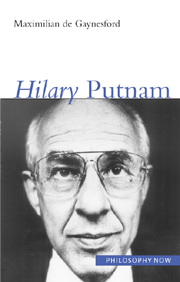9 - Language
from Part III - Content: earlier perspectives
Summary
As far as the laws of mathematics refer to reality, they are not certain;
and so far as they are certain, they do not refer to reality
Albert Einstein, Sidelights on Relativity (1922: 28)Einstein's point draws attention to the complex interrelations among three topics: how it is possible to make statements in mathematics; how it is possible to know those statements; and how it is possible for those statements to be about what they are about. If we extend the question to the whole realm of scientific statements, then his remark captures Putnam's deepest concerns. Given the conclusions to which we have seen him come in his early work on scientific theorizing, it became evident that his background position on intentionality (and most particularly on the way words refer to reality) required support in two fundamental and related ways.
First, it was necessary to offer a consistent explanation of what occurs as a result of scientific investigations and discoveries. Only then might one accept his view of the situation we have just examined: that it is people's beliefs and knowledge which changed, not the reference of the words they used. Secondly, it was necessary to supply a consistent explanation of what and how words mean what they do. Only then might one endorse his radically non-conventionalist account of the connection between established words and reality. And in order to satisfy either requirement, it was necessary to take a position on the nature of mental phenomena.
- Type
- Chapter
- Information
- Hilary Putnam , pp. 97 - 112Publisher: Acumen PublishingPrint publication year: 2006

